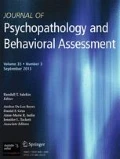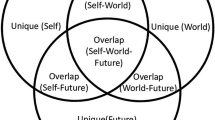Abstract
The relationship of young adolescents' scores on the Children's Depression Inventory (CDI) to subjective and objective indices of their social and cognitive functioning was examined. Subjects were 89 young adolescents (11–15 years old), their parents, and their social studies teachers. The correlations of adolescents' CDI scores with recent school grades, objective ratings of overt social behavior, and measures of adolescent social and cognitive competence as perceived by the adolescent, both parents, and the teacher were examined. CDI scores were significantly and negatively correlated with school grades, behavioral ratings of positive social communication, and adolescent, mother, father, and teacher perceptions of the adolescents' social and cognitive competence. The relationship of these findings to those of other CDI validity studies is discussed.
Similar content being viewed by others
References
Alloy, L. B., & Abramson, L. Y. (1979). The judgment of contingency in depressed and nondepressed students: Sadder but wiser?Journal of Experimental Psychology, General, 108, 441–485.
Carroll, B. J., Fielding, J. M., & Blashki, T. G. (1973). Depression rating scales.Archives of General Psychiatry, 28, 361–366.
Carson, T. P., & Adams, H. E. (1981). Affective disorders: Behavioral perspectives. In S. M. Turner, K. S. Calhoun, & H. E. Adams (Eds.),Handbook of clinical behavior therapy (pp. 125–161). New York: Wiley.
Costello, C. G. (1981). Childhood depression. In E. J. Mash & L. B. Terdal (Eds.),Behavioral assessment of childhood disorders (pp. 305–346). New York: Guilford Press.
Digdon, N., & Gotlib, I. H. (1985). Developmental considerations in the study of childhood depression.Developmental Review, 5, 162–199.
Faust, J., Baum, C. B., & Forehand, R. (1985). An examination of the association between social relationships and depression in early adolescence.Journal of Applied Developmental Psychology, 6, 291–297.
Finch, A. J., Saylor, C. F., & Edwards, G. L. (1985) Children's Depression Inventory: Sex and grade norms for normal children.Journal of Consulting and Clinical Psychology, 53, 424–425.
Glaser, K. (1967). Masked depression in children and adolescents.American Journal of Psychotherapy, 21, 565–574.
Harter, S. (1982). The perceived competence scale for children.Child Development, 53, 87–97.
Jacobsen, R. H., Lahey, B. B., & Strauss, C. C. (1983). Correlates of depressed mood in normal children.Journal of Abnormal Child Psychology, 11, 29–40.
Kaslow, N. J., Rehm, L. P., & Siegel, A. W. (1984). Social-cognitive and cognitive correlates of depression in children.Journal of Abnormal Child Psychology, 12, 605–620.
Kazdin, A. E. (1981). Assessment techniques for childhood depression.Journal of the American Academy of Child Psychiatry, 20, 358–375.
Kazdin, A. E., Esveldt-Dawson, E., Sherick, R. B., & Colbus, D. (1985). Assessment of overt behavior and childhood depression among psychiatrically disturbed children.Journal of Consulting and Clinical Psychology, 53, 201–210.
Kazdin, A. E., Esveldt-Dawson, K., Unis, A. S., & Rancurello, M. D. (1983). Child and parent evaluations of depression and aggression in psychiatric inpatient children.Journal of Abnormal Child Psychology, 11, 401–413.
Kazdin, A. E., French, N. H., Unis, A. S., & Esveldt-Dawson, K. (1983). Assessment of childhood depression: Correspondence of child and parent ratings.Journal of the American Academy of Child Psychiatry, 22, 157–164.
Kazdin, A. E., French, N. H., Unis, A. S., Esveldt-Dawson, K., & Sherick, R. B. (1983). Hopelessness, depression, and suicidal intent among psychiatrically disturbed inpatient children.Journal of Consulting and Clinical Psychology, 51, 504–510.
Kazdin, A. E., Sherick, R. B., Esveldt-Dawson, K., & Rancurello, M. (1985). Nonverbal behavior and childhood depression.Journal of the American Academy of Child Psychiatry, 24, 303–309.
Kovacs, M. (1981). Rating scales to assess depression in school-aged children.Acta Paedopsychiatria, 46, 305–315.
Kovacs, M. (1983).The Children's Depression Inventory: A self-rated depression scale for schoolaged youngsters. Unpublished manuscript, University of Pittsburgh, School of Medicine.
Leon, G. R., Kendall, P. C., & Garber, J. (1980). Depression in children: Parent, teacher, and child perspectives.Journal of Abnormal Child Psychology, 8, 221–235.
McLean, P. D. (1981). Behavioral treatment of depression. In W. E. Craighead, A. E. Kazdin, & M. J. Mahoney (Eds.),Behavior modification: Principles, issues, and applications (pp. 223–242). Boston: Houghton Mifflin.
Moretti, M. M., Fine, S., Haley, C., & Marriage, K. (1985). Childhood and adolescent depression: Child-report versus parent-report information.Journal of the American Academy of Child Psychiatry, 24, 298–302.
Mullins, L. L., Siegel, L. J., & Hodges, K. (1985). Cognitive problem-solving and life event correlates of depressive symptoms in children.Journal of Abnormal Child Psychology, 13, 305–314.
Myers, J. K., & Bean, L. J. (1968).A decade later: A follow-up of social class and mental illness. New York: Wiley.
Reynolds, W. M., Anderson, G., & Bartell, N. (1985). Measuring depression in children: A multimethod assessment investigation.Journal of Abnormal Child Psychology, 13, 513–526.
Robin, A. L., & Canter, W. (1984). A comparison of the marital interaction coding system and community ratings for assessing mother-adolescent problem-solving.Behavioral Assessment, 6, 303–313.
Sacco, W. P., & Graves, D. J. (1984). Childhood depression, interpersonal problem-solving, and self-ratings of performance.Journal of Clinical Child Psychology, 13, 10–15.
Seligman, M., Peterson, C., Kaslow, N., Tanenbaum, R., Alloy, L., & Abramson, L. (1984). Attributional style and depression symptoms among children.Journal of Abnormal Psychology, 93, 235–238.
Smucker, M. R., Craighead, W. E., Craighead, L. W., & Green, B. J. (1986). Normative and reliability data for the Children's Depression Inventory.Journal of Abnormal Child Psychology, 14, 25–39.
Steinfeld, B. I., Foster, S. L., Prinz, R. J., Robin, A. L., & Weiss, J. (in press). Issues of conflict for mothers and adolescents: A descriptive and developmental analysis.American Journal of Family Therapy.
Strauss, C. C., Forehand, R. L., Frame, C., & Smith, K. (1984). Characteristics of children with extreme scores on the Children's Depression Inventory.Journal of Clinical Child Psychology, 13, 227–231.
Strauss, C. C., Lahey, B. B., & Jacobsen, R. H. (1982). The relationship of three measures of childhood depression to academic underachievement.Journal of Applied Developmental Psychology, 3, 375–380.
Tisher, M., & Lang, M. (1982). The Children's Depression Scale: Review and further developments. In D. P. Cantwell & G. A. Carlson (Eds.),Childhood depression. New York: Spectrum.
Weissman, M. M., Orvaschel, H., & Padian, N. (1980). Children's symptom and social functioning self-report scales: Comparison of mothers' and childrens' reports.Journal of Nervous and Mental Disease, 168, 736–740.
Wiggins, J. S. (1973).Personality and prediction: Principles of personality assessment. Reading, MA: Addison-Wesley.
Author information
Authors and Affiliations
Additional information
This research was supported, in part, by the William T. Grant Foundation and the University of Georgia's Institute for Behavioral Research.
Rights and permissions
About this article
Cite this article
Fauber, R., Forehand, R., Long, N. et al. The relationship of young adolescent Children's Depression Inventory (CDI) scores to their social and cognitive functioning. J Psychopathol Behav Assess 9, 161–172 (1987). https://doi.org/10.1007/BF00960572
Accepted:
Issue Date:
DOI: https://doi.org/10.1007/BF00960572




